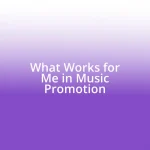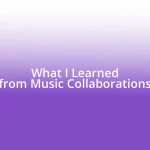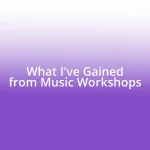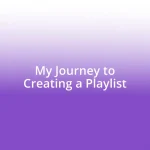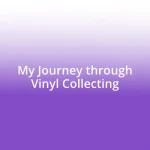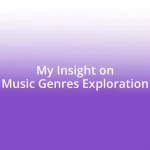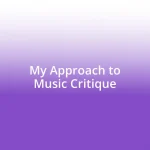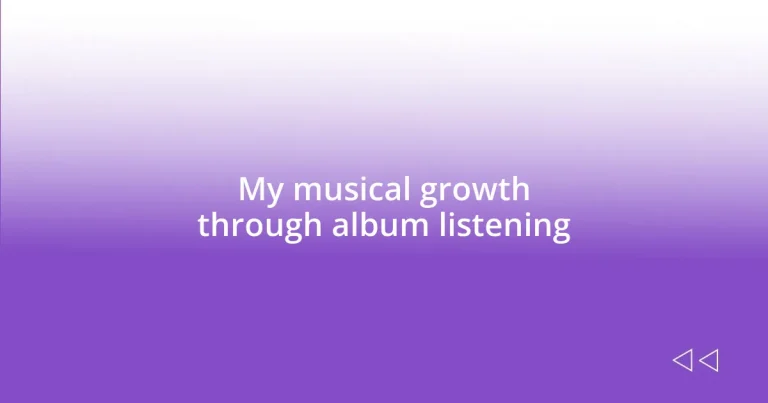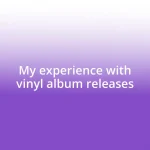Key takeaways:
- Musical growth is a personal journey shaped by the emotional connections and experiences tied to different genres and albums.
- Listening to entire albums enhances appreciation of storytelling and intricate musical composition compared to individual songs.
- Exploring diverse genres deepens emotional understanding and cultural awareness, allowing for richer musical experiences.
- Sharing insights about music with others fosters community and can provide new perspectives, deepening the overall understanding of songs and albums.
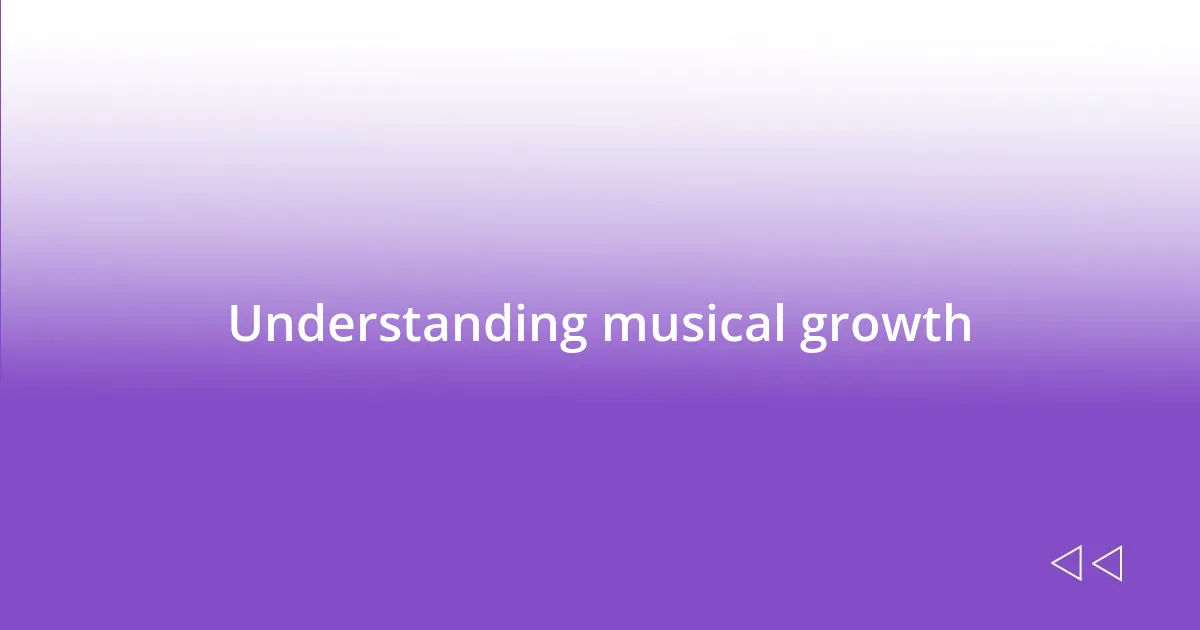
Understanding musical growth
Musical growth often unfolds through our evolving relationship with sound. I remember when I first discovered jazz; it was like peeling back layers of complexity in music. Each new album introduced me to a different rhythm or technique that challenged my ear and made me appreciate the beauty in improvisation.
As I engaged with various genres, I began to notice changes in my emotional responses to music. Have you ever listened to a song in a different mood and felt it resonate in a completely new way? That’s the magic of musical growth; it’s not just about the notes but how they intertwine with our experiences and feelings at different times in our lives.
Reflecting on my journey, I realize that each album I explored contributed to my understanding of musical nuances, like how a simple chord change can evoke intense feelings of nostalgia or joy. This growth is a personal evolution that requires openness and curiosity, inviting us to step out of our comfort zones and embrace new sounds and styles.
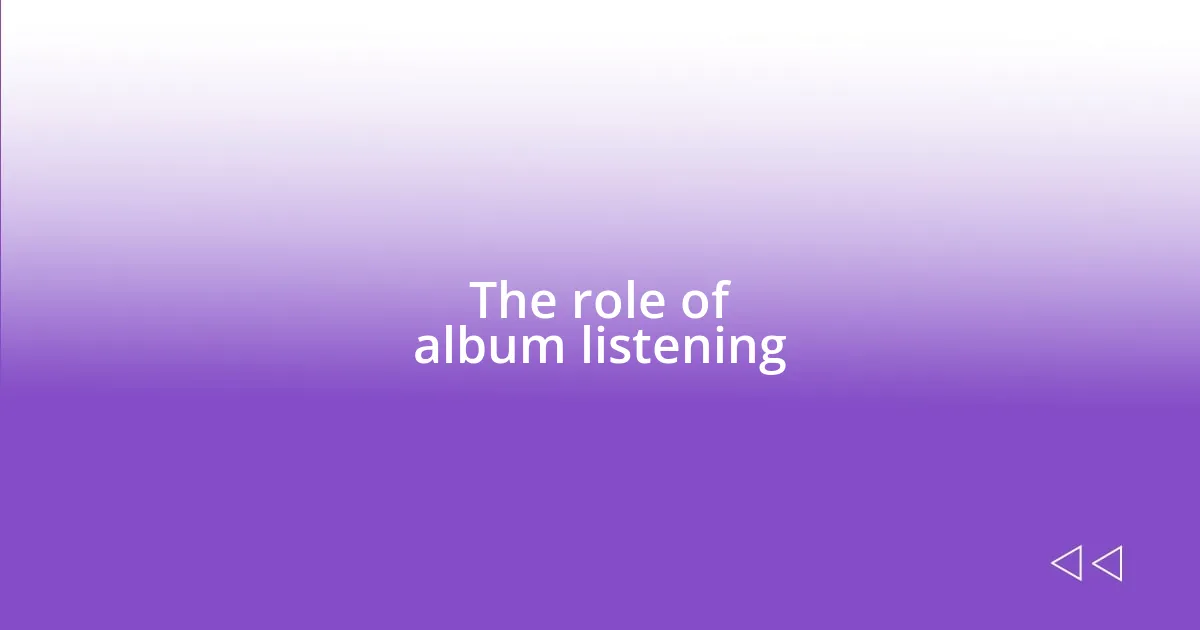
The role of album listening
Listening to entire albums has played a crucial role in shaping my musical identity. Unlike individual songs, albums are like sonic journeys that tell complete stories. For example, when I dove into Fleetwood Mac’s “Rumours,” every track revealed layers of emotion and coherence that I hadn’t noticed before. This immersive experience deepens my connection to the music and offers a richer understanding of the artist’s intentions.
I’ve often found that focusing on an album helps me to appreciate the intricacies of songwriting and production. When I spent time with Kendrick Lamar’s “To Pimp a Butterfly,” I was struck by the progression through its themes of identity and struggle. It wasn’t just about enjoying the catchy hooks; it was about experiencing how each song contributed to a larger conversation. This practice has expanded my taste and sparked a curiosity to dive deeper into the meanings behind the music.
Engaging with albums also allows me to reflect on my personal growth. I recall listening to Nora Jones’s “Come Away With Me” during a period of transition, and the entire album became a soundtrack to my experiences. Each listen was a reminder of the feelings I navigated during that time, illustrating how music can be a mirror of our journey. This ongoing dialogue with music enriches my life, prompting me to explore various genres and discover new favorites.
| Aspect | Single Songs | Albums |
|---|---|---|
| Emotional Depth | Often shallow | Rich storytelling |
| Context Understanding | Limited context | Full narrative |
| Listening Experience | Brief engagement | Immersive experience |
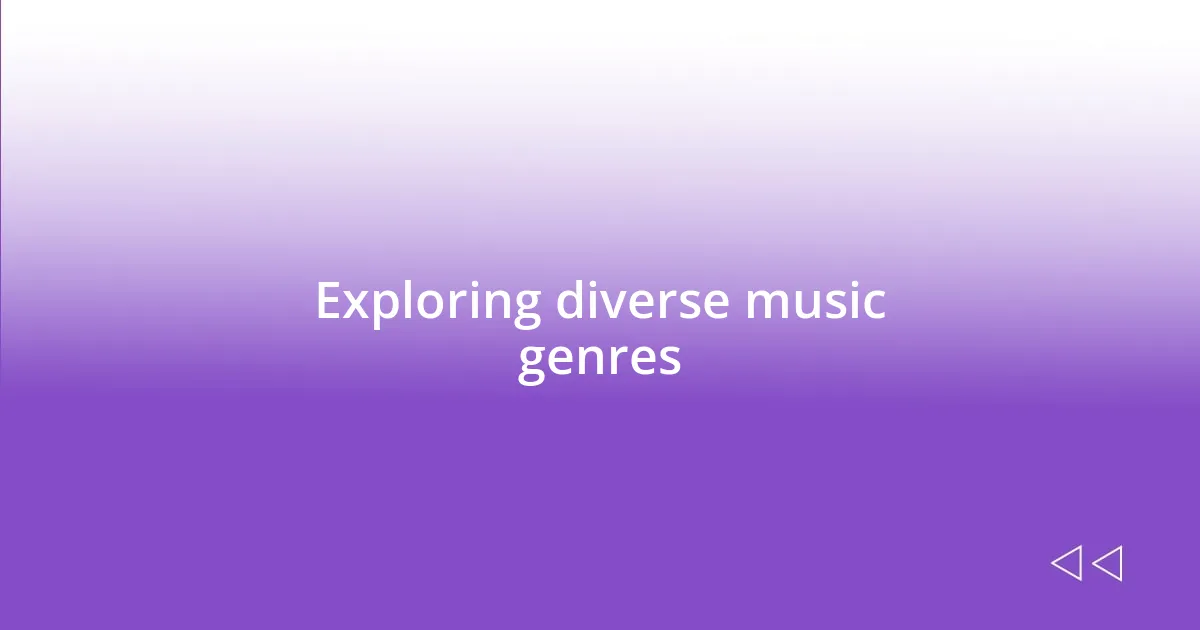
Exploring diverse music genres
Exploring different music genres has been like taking a scenic route through my musical landscape. Each genre I’ve delved into has illuminated aspects of sound and culture that were previously foreign to me. For instance, when I first ventured into reggae, I felt the warmth of its rhythm wrap around me, evoking a sense of relaxation and freedom. I recall laying in the grass on a sunny afternoon, vibing to Bob Marley, and realizing how the genre’s incorporation of social messages resonates deeply with the spirit of resistance and hope.
Taking the time to explore various genres opens up a world of emotional expression and connection. Here are some genres that have deeply influenced me:
- Classical: The emotional depth of a symphony can elevate my mood or calm my mind like nothing else.
- Hip-Hop: Lyrical storytelling has taught me about community struggles, enriching my understanding of different experiences.
- Blues: It resonates with my feelings of longing and heartache, reminding me of personal moments, both joyful and sorrowful.
- Electronic: The intricate layers of production give me a sense of escape and experimentation, pushing the boundaries of sound.
- Folk: The simplicity and authenticity in folk music often bring me back to my roots, reminding me of the power of storytelling through melodies.
By immersing myself in these genres, I’ve discovered that each style not only broadens my musical palette but also enriches my emotional understanding of the world around me.
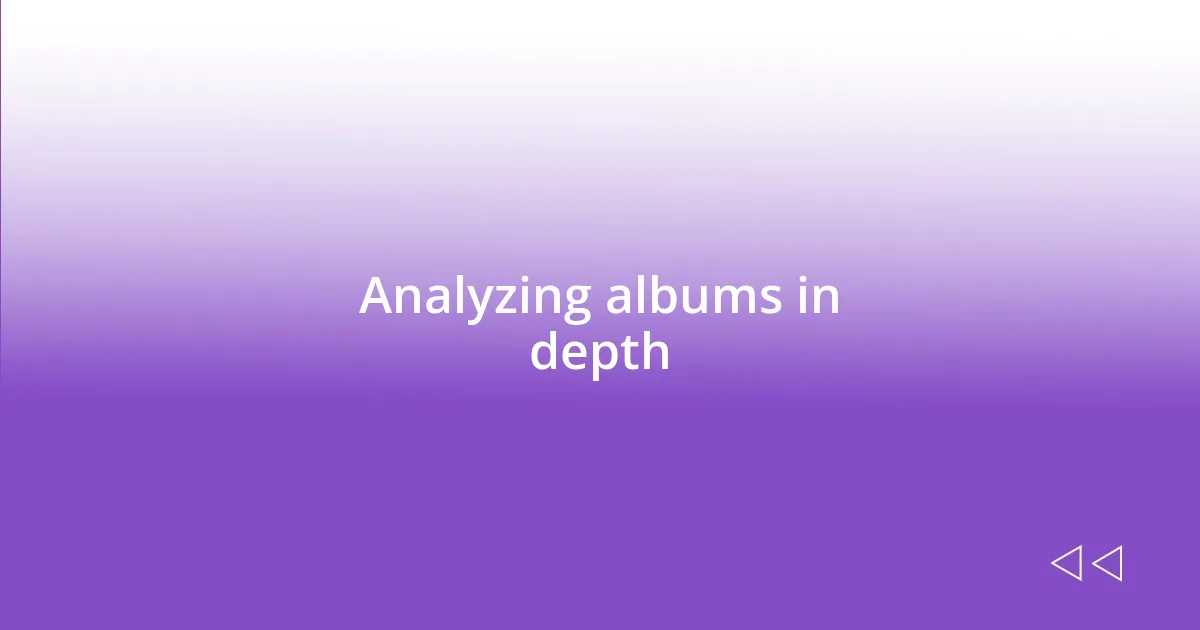
Analyzing albums in depth
Diving deeply into albums transforms the listening experience into something profound. For instance, when I explored Radiohead’s “OK Computer,” the haunting melodies and cryptic lyrics made me reflect on the anxieties of modern life. Isn’t it fascinating how an album can resonate with our personal experiences, making us feel understood? Every listen felt like uncovering a new layer of meaning, much like peeling an onion.
Engaging with the nuances of each track also lets me appreciate the technical craft behind the music. The sparse yet powerful instrumentation in Bon Iver’s “For Emma, Forever Ago” evokes a sense of solitude that perfectly complements the lyrical themes of loss and reminiscence. I often think about how this meticulous attention to detail in songwriting can evoke such raw emotion, sparking memories from my own experiences. Have you ever wondered how a certain sound can pull you back to a moment in time?
As I analyze albums, I find that they often serve as a soundtrack to my life. Listening to Adele’s “21” during a challenging breakup was cathartic; each ballad became a companion in my healing process. I still vividly remember how “Someone Like You” made me cry but also empowered me to move forward. Have you ever felt that connection with an album, where it perfectly encapsulates your mood and emotions? It’s these deep connections that turn mere music into something transformative, guiding us through the highs and lows of our journeys.
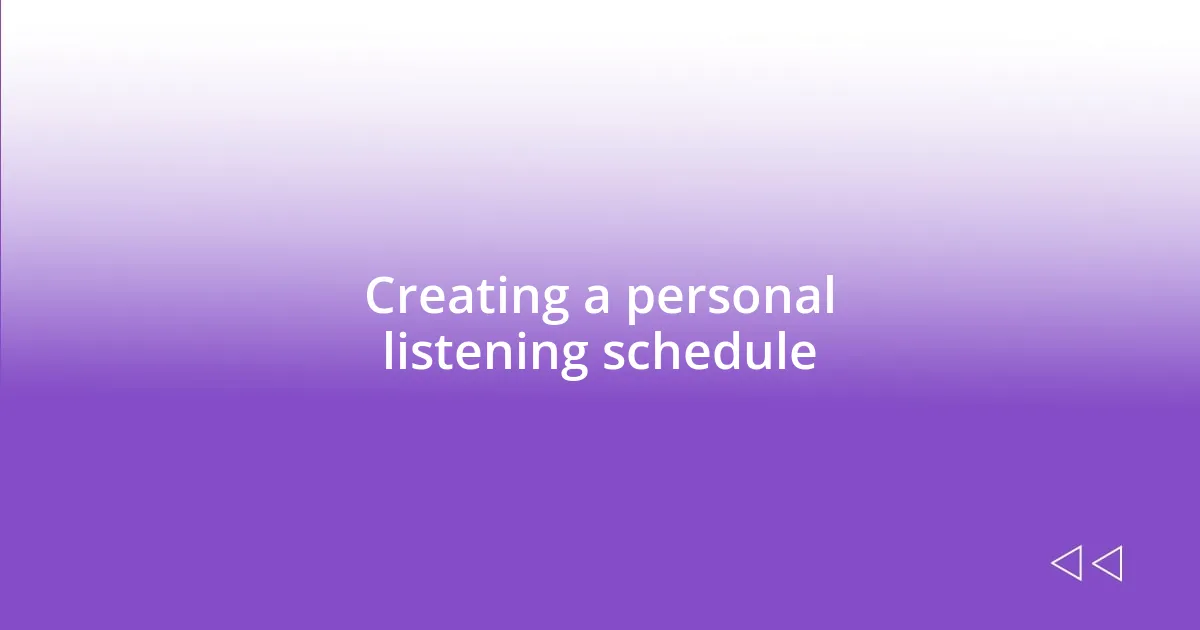
Creating a personal listening schedule
Creating a personal listening schedule has been one of the best decisions I’ve made for my musical growth. I like to set aside specific times throughout the week dedicated solely to listening to albums without distractions. This routine has not only helped me immerse myself fully in the music but also allowed me to analyze the intricate details of each track, much like setting aside time for meditation.
I often found that following a schedule keeps me accountable and curious about the music I choose. For example, I might designate Monday evenings for jazz exploration, diving into the soothing sounds of Miles Davis, while Wednesdays are reserved for more intense and introspective albums like Fiona Apple’s “Fetch the Bolt Cutters.” Have you ever felt the anticipation of knowing exactly what musical journey awaits you on a certain day? I get excited thinking about the emotional space each genre brings and how it aligns with my mood throughout the week.
One of the most rewarding aspects of following a listening schedule is the surprise insights that emerge. While listening to Sufjan Stevens on a rainy Sunday afternoon, I found myself reflecting on my own memories of autumn walks, distinguishing how sound can evoke nostalgia. I remember jotting down thoughts in my journal, realizing how this simply structured listening could spark complex emotions. Isn’t it incredible how creating a schedule can guide you to discover layers of yourself you might not encounter otherwise?
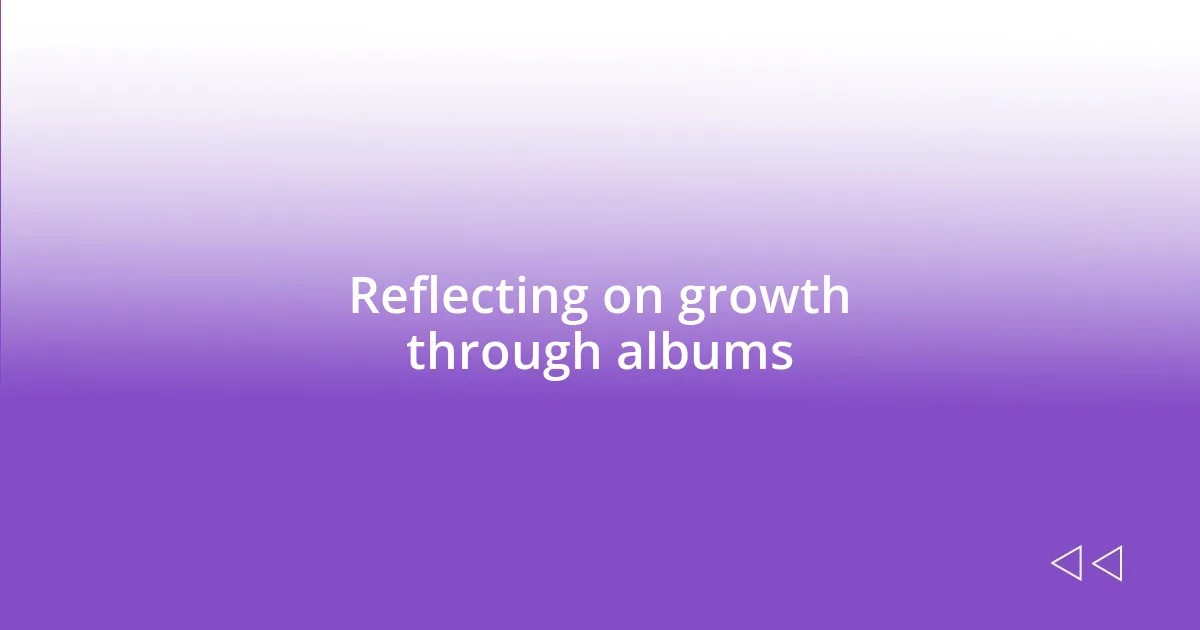
Reflecting on growth through albums
Reflecting on my musical growth through albums has been deeply enlightening. I recall listening to Joni Mitchell’s “Blue” during a period of self-discovery. Each song unfolded like a page in a diary, helping me understand my emotions better. Have you ever felt as if an artist is sharing your inner thoughts through their lyrics? It’s moments like these that truly connect us to the music, creating an intimate bond with the artist and ourselves.
I also find that certain albums mark distinct stages in my life, almost like milestones. When I immersed myself in Kendrick Lamar’s “To Pimp a Butterfly,” I was struck by its commentary on identity and social justice, which mirrored my own awakening to cultural issues. Reflecting back, it was a pivotal moment that prompted me to engage more actively in conversations about race and equity. Can you think of an album that has shaped your perspective on the world? It’s fascinating how music can push our understanding of ourselves and the society we inhabit.
Another memorable album experience came from listening to Fleetwood Mac’s “Rumours,” especially during my transitions in friendships. The heartbreak and resilience expressed in tracks like “Go Your Own Way” reminded me that growth often comes with pain. I remember belting out the chorus, finding solace in shared human experiences of love and loss. Isn’t it remarkable how an album can encapsulate those feelings so perfectly? Each listen serves as a reminder that my musical journey is intertwined with my evolving sense of self.
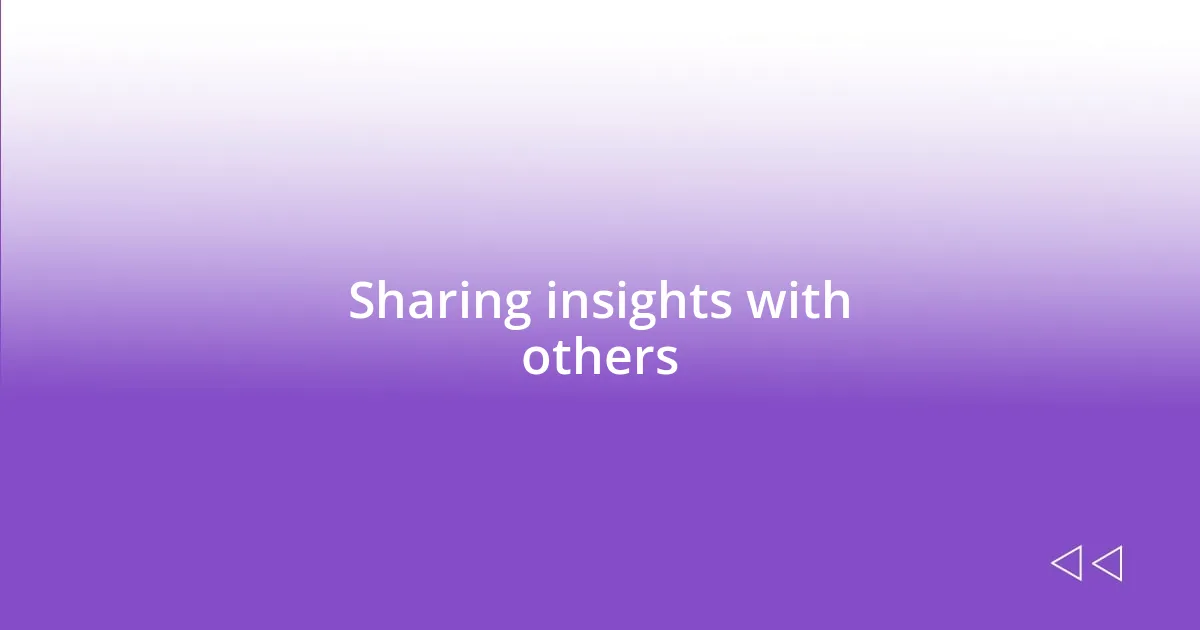
Sharing insights with others
Sharing insights with others has always been a highlight of my musical journey. I cherish those moments when I chat with friends about an album that struck a chord with me. Recently, I couldn’t stop raving about Bon Iver’s “For Emma, Forever Ago.” I invited a couple of friends over, and we lost ourselves in discussions about its haunting melodies. Have you ever noticed how sharing interpretations can deepen your understanding of music? It’s as if each person adds another layer of meaning to the same song.
Another way I find joy in sharing insights is through social media. After listening to “1989” by Taylor Swift, I crafted a post that reflected how the themes of love and transformation resonated with my own experiences. The responses from my followers were incredible; people eagerly shared their personal stories and connections to the album. Isn’t it beautiful to see how music acts as a universal language that fosters empathy and connection? This exchange of insights makes the listening experience feel communal, creating bonds that sometimes exceed the music itself.
I’ll never forget a spontaneous album listening session I hosted last summer. I asked guests to bring along their favorite albums to share. As we took turns playing tracks, the conversations flowed effortlessly. I learned about my friend’s tumultuous relationship with Nirvana through “Nevermind,” and it struck me how music can serve as both a comfort and a mirror to our experiences. Do you have a story like that? Those moments made me realize that sharing insights doesn’t just enhance our relationship with music; it enriches our relationships with one another. It’s an exploration that feels endless and deeply fulfilling.
